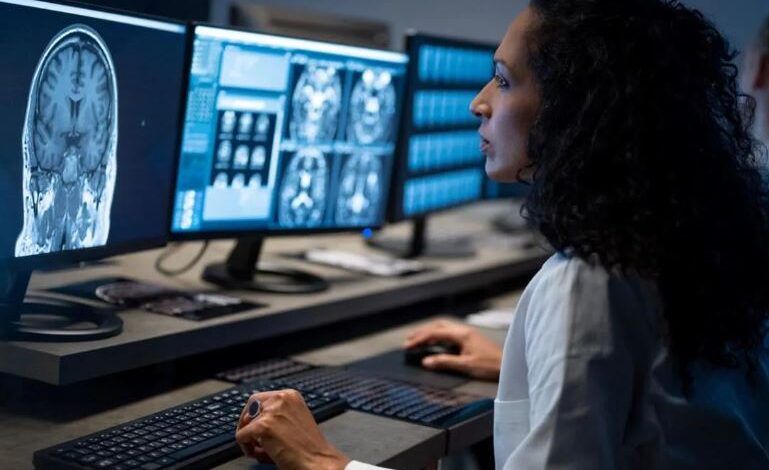
AI and advanced imaging could diagnose childhood brain tumours without biopsy
A study led by Birmingham Health Partners member organisations has found that combining advanced imaging and artificial intelligence techniques can accurately classify the characteristics of common types of childhood brain tumours – paving the way for more rapid non-invasive diagnosis.
Brain tumours in a particular part of the brain, called the posterior fossa, are the largest cause of death from cancer in children. There are three main types of tumour that occur in the posterior fossa, and being able to characterise them quickly and efficiently can be challenging without confirmation via a biopsy, which is invasive.
Now a new study, carried out in collaboration with researchers from WMG at the University of Warwick and published in Scientific Reports, has found tumour diagnostic classification can be improved by using an advanced and non-invasive imaging technique known as ‘diffusion weighted imaging’ in combination with machine learning (AI). This means that the tumour can be characterised and treated more efficiently.
Diffusion weighted imaging involves the use of specific advanced MRI sequences, as well as software that generates images from the resulting data which uses the diffusion of water molecules to generate contrast in MR image. Experts can then extract a ‘map’ which can be analysed to give more information about the tumour.
The study involved 117 patients at five primary treatment centres across the UK, with images taken using machines across 12 hospitals. The images were analysed by both an experienced radiologist and an expert scientist in paediatric neuroimaging. Analysis from the images were fed to AI algorithms to successfully discriminate the three most common types of paediatric posterior fossa brain tumours, non-invasively.
Professor Andrew Peet, NIHR Professor in Clinical Paediatric Oncology at BHP founder-members the University of Birmingham and Birmingham Women’s and Children’s NHS Foundation Trust, said: “When a child comes to hospital with symptoms that could mean they have a brain tumour, that initial scan is such a difficult time for the family and understandably they want answers as soon as possible.
“Here we have combined readily available scans with artificial intelligence to provide high levels of diagnostic accuracy that can start to give some answers.
“Previous studies using these techniques have largely been limited to single expert centres. Showing that they can work across such a large number of hospitals opens the door to many children benefitting from rapid non-invasive diagnosis of their brain tumour.
“These are very exciting times and we are working hard now to start making these artificial intelligence techniques widely available.”
Professor Theo Arvanitis, Director of the Institute of Digital Health at WMG, University of Warwick, and one of the authors of the study, added: “If this advanced imaging technique, combined with AI technology, can be routinely enrolled into hospitals it means that childhood brain tumours can be characterised and classified more efficiently, and in turn means that treatments can be pursued in a quicker manner with favourable outcomes for children suffering from the disease.”
The research was supported by Cancer Research UK, EPSRC Cancer Imaging Programme at the Children’s Cancer and Leukaemia Group, the Medical Research Council, National Institute for Health Research (NIHR), Children’s Research Fund, Poppyfields and Help Harry Help Others.